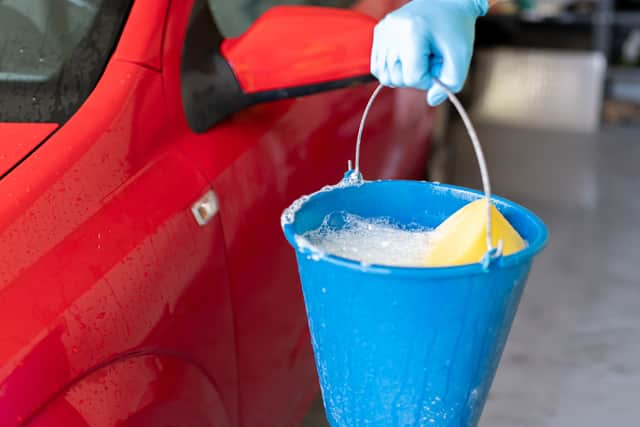Can I wash my car during a hosepipe ban? Rules on cleaning vehicles and the fines for breaking the law
and live on Freeview channel 276
A growing number of water companies are imposing a hosepipe ban on customers as they struggle with water levels.
Even as forecasters predict storms for some parts of the country, drought conditions have been declared in several parts of England, with reservoirs running low.
Advertisement
Hide AdAdvertisement
Hide AdSeveral water companies, including Yorkshire Water, Thames Water, Southern Water, South East Water and Welsh Water, have already annouced hosepipe bans. Some, including Southern Water and South East Water, have started restrictions while others will come into force in coming days and weeks.
Hosepipe bans are rare in the UK but it is thought even more water authorities could introduce them if conditions don’t change quickly. Several have asked customers to preserve water where they can and the Environment Agency has convened the National Drought Group to discuss water supplies, which could indicate broader restrictions in future.


As their name suggests, hosepipe bans restrict how households can use outside water supplies and under a hosepipe ban you cannot use a hose to wash your car, caravan or trailer.
Washing a car using a hosepipe uses a huge amount of water - between 400 and 480 litres, according to USwitch - which is why it is included in the ban.
Advertisement
Hide AdAdvertisement
Hide AdIf you are caught breaking the ban, you could face a fine of up to £1,000.
How to wash a car during a hosepipe ban
Despite the restrictions, you can still wash your car using other methods which are far less water-intensive.
You are still allowed to fill a bucket from a tap and use that to wash your car. It is estimated that this will use around 32 litres of water, compared to the 400+ litres a hose uses. You can even use a watering can to help rinse any soapy water off.
Alternatively, you can use “grey water”, which is water that’s already been used, in the bath for example. It’s not advisable to use any water that contains regular washing-up liquid, however, as this isn’t good for a car’s paint or plastic and rubber components.
Advertisement
Hide AdAdvertisement
Hide AdAnd if you have your own water supply, such as a private borehole, or a water recycling system such as a water butt, you can still connect a hose to that for outdoor use.
You could also consider waterless wash products. There are dozens on the market which claim to break down and remove dirt with a quick spray and wipe of a cloth - removing the need to pre-wet or rinse your car.
Once you’ve cleaned your car once, you can also take steps to reduce the need to wash it again. Apply a proper protective wax will help keep it looking shiny and repel dirt for longer. And, if you can, park somewhere sheltered where dust and dirt are less likely to accumulate while you’re stopped.
Who is exempt from a hosepipe ban?
Although most private households are subject to the bans, some such as those who are registered as disabled or on a water firm’s priority service register, are exempt.
Commercial car washes are also excluded from the restrictions, meaning you can still pay someone else to do the hard work for you.
Comment Guidelines
National World encourages reader discussion on our stories. User feedback, insights and back-and-forth exchanges add a rich layer of context to reporting. Please review our Community Guidelines before commenting.
